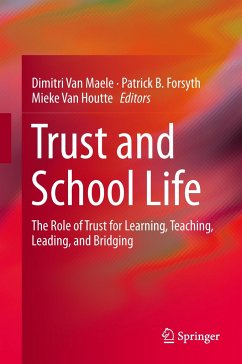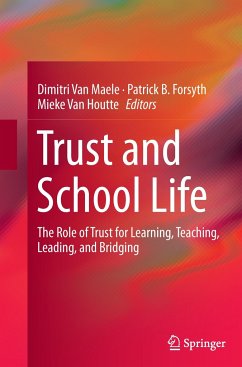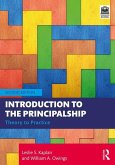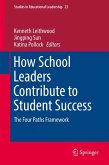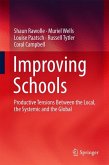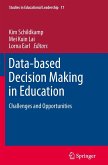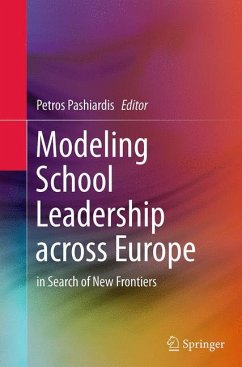Trust and School Life
The Role of Trust for Learning, Teaching, Leading, and Bridging
Herausgegeben:Van Maele, Dimitri; Forsyth, Patrick B.; Van Houtte, Mieke
Trust and School Life
The Role of Trust for Learning, Teaching, Leading, and Bridging
Herausgegeben:Van Maele, Dimitri; Forsyth, Patrick B.; Van Houtte, Mieke
- Gebundenes Buch
- Merkliste
- Auf die Merkliste
- Bewerten Bewerten
- Teilen
- Produkt teilen
- Produkterinnerung
- Produkterinnerung
This book samples recent and emerging trust research in education including an array of conceptual approaches, measurement innovations, and explored determinants and outcomes of trust. The collection of pathways explores the phenomenon of trust and establishes the significance of trust relationships in school life. It emboldens the claim that trust merits continued attention of both scholars and practitioners because of the role it plays in the production of equity and excellence. Divided into four parts, the book explores trust under the rubrics of learning, teaching, leading and…mehr
Andere Kunden interessierten sich auch für
![Trust and School Life Trust and School Life]() Trust and School Life75,99 €
Trust and School Life75,99 €![Introduction to the Principalship Introduction to the Principalship]() Leslie S. KaplanIntroduction to the Principalship64,99 €
Leslie S. KaplanIntroduction to the Principalship64,99 €![How School Leaders Contribute to Student Success How School Leaders Contribute to Student Success]() How School Leaders Contribute to Student Success112,99 €
How School Leaders Contribute to Student Success112,99 €![Improving Schools Improving Schools]() Shaun RawolleImproving Schools38,99 €
Shaun RawolleImproving Schools38,99 €![Data-based Decision Making in Education Data-based Decision Making in Education]() Data-based Decision Making in Education127,99 €
Data-based Decision Making in Education127,99 €![Collaboration and Networking in Education Collaboration and Networking in Education]() Daniel MuijsCollaboration and Networking in Education75,99 €
Daniel MuijsCollaboration and Networking in Education75,99 €![Modeling School Leadership across Europe Modeling School Leadership across Europe]() Modeling School Leadership across Europe38,99 €
Modeling School Leadership across Europe38,99 €-
-
-
This book samples recent and emerging trust research in education including an array of conceptual approaches, measurement innovations, and explored determinants and outcomes of trust. The collection of pathways explores the phenomenon of trust and establishes the significance of trust relationships in school life. It emboldens the claim that trust merits continued attention of both scholars and practitioners because of the role it plays in the production of equity and excellence. Divided into four parts, the book explores trust under the rubrics of learning, teaching, leading and bridging.
The book proposes a variety of directions for future research. These include the simultaneous investigation of trust from the prospectives of various trusters, and at both the individual and group levels, longitudinal research designs, and an elaboration of methods.
The book proposes a variety of directions for future research. These include the simultaneous investigation of trust from the prospectives of various trusters, and at both the individual and group levels, longitudinal research designs, and an elaboration of methods.
Produktdetails
- Produktdetails
- Verlag: Springer / Springer Netherlands
- Artikelnr. des Verlages: 978-94-017-8013-1
- 2014
- Seitenzahl: 360
- Erscheinungstermin: 17. Februar 2014
- Englisch
- Abmessung: 241mm x 160mm x 25mm
- Gewicht: 649g
- ISBN-13: 9789401780131
- ISBN-10: 9401780137
- Artikelnr.: 39725653
- Herstellerkennzeichnung Die Herstellerinformationen sind derzeit nicht verfügbar.
- Verlag: Springer / Springer Netherlands
- Artikelnr. des Verlages: 978-94-017-8013-1
- 2014
- Seitenzahl: 360
- Erscheinungstermin: 17. Februar 2014
- Englisch
- Abmessung: 241mm x 160mm x 25mm
- Gewicht: 649g
- ISBN-13: 9789401780131
- ISBN-10: 9401780137
- Artikelnr.: 39725653
- Herstellerkennzeichnung Die Herstellerinformationen sind derzeit nicht verfügbar.
DIMITRI VAN MAELE is a postdoctoral researcher in the Department of Sociology, Research Group CuDOS, at Ghent University (Belgium). His research interests are mainly situated within the fields of the sociology of education, the sociology of organizations, and educational leadership. During his doctoral studies he has focused on exploring antecedents and consequences of teacher trust in school. After obtaining his PhD he was appointed as research coordinator of an interuniversity project which explores the effectiveness of gender-sensitive strategies with regard to academic achievement, school retardation, the motivation to learn and the aspirations of boys and girls in secondary education. His work has been published in international peer-reviewed journals, such as Educational Administration Quarterly, Teaching and Teacher Education, American Journal of Education, Oxford Review of Education, and Teachers College Record. PATRICK B. FORSYTH is professor of education at the University of Oklahoma and co-director of the Center for Education Policy. His research, all organized under the rubric of schools as organizations, has focused on collective trust, organizational structure, work alienation, and professionalization. He has served the American Education Research Association as Division A vice president and member of Executive Council and The University Council for Educational Administration as director for fifteen years. Together with Curt M. Adams and Wayne K. Hoy, he authored Collective Trust: Why Schools Can't Improve Without It (Teachers College Press) in 2011. MIEKE VAN HOUTTE is professor in Sociology at the Department of Sociology, Research Group CuDOS, at Ghent University (Belgium). Her research interests cover diverse topics within the sociology of education, particularly the effects of structural and compositional school features on several outcomes for students and teachers, and educationalinequality. Additionally, she supervises projects within the domain of LGB studies. Her work has been published in journals such as Journal of Curriculum Studies, Journal of Educational Research, School Effectiveness and School Improvement, Sociology of Education, Youth & Society, and American Educational Research Journal. She chairs the Flemish Sociological Association and is member of the board of the Flemish Forum for Educational Research, and vice-president of the Research Network Sociology of Education of the European Sociological Association.
Chapter 1: Introduction.- PART I: TRUST AND LEARNING.- Chapter 2: Trust in Elementary and Secondary Urban Schools: A Pathway for Student Success and College Ambition; Barbara Schneider, Justina Judy, Christina Mazuca and Michael Broda.- Chapter 3: The Interconnectivity of Trust in Schools; Megan Tschannen-Moran.- Chapter 4: Organizational Predictability, the School Principal and Achievement; Patrick B. Forsyth and Curt M. Adams.- Chapter 5: Teacher Trust in the Principal: Factor Structure and Effects; Monixa Makiewicz and Douglas Mitchell.- PART II: TRUST AND TEACHING.- Chapter 6: The Effects of Standards Based School Accountability on Teacher Burnout and Trust Relationships: A Longitudinal Analysis; Anthony Gary Dworkin and Pamela F. Tobe.- Chapter 7: Trust at Ground Zero: Trust and Collaboration within the Professional Learning Community; Pamela R. Hallam, Shannon K. Dulaney, Julie M. Hite and Hank R. Smith.- Chapter 8: Teacher Trust in Students and the Organizational School Context: The Role of Student Culture and Teachability Perceptions; Dimitri Van Maele and Mieke Van Houtte.- Chapter 9: Mentoring, Trust and Teacher Efficacy: A Powerful Force for New Teacher Induction; Serafino M. Celano and Roxanne M. Mitchell.- PART III: TRUST AND LEADING.- Chapter 10: Linking Social Networks and Trust at Multiple Levels: Examining Dutch Elementary Schools; Nienke M. Moolenaar, Sjoerd Karsten, Peter J.C. Sleegers and Alan J. Daly.- Chapter 11: Trust, Control and Comprehensive School Reform: Investigating Growth in Teacher-Teacher Relational Trust in Success for All Schools; Timothy G. Ford.- Chapter 12: Principal Influence and Faculty Trust: An Analysis of Teacher Perceptions in Middle Schools; Page A. Smith and Adrian A. Flores. PART IV: TRUST AND BRIDGING.- Chapter 13: The Principal Connection: Trust and Innovative Climate in a Network of Reform; Alan J. Daly, Yi-Hwa Liou and Nienke M. Moolenaar.- Chapter 14: Trust in Districts: The Role of Relationships in Policymaking for School Improvement; Julie Reed Kockanek and Matthew Clifford.- Chapter 15: Teachers' Trust in Knowledge Sources for Continuing Professional Development: Investigating Trust and Trustworthiness in School Systems; Wieland Wermke.
Chapter 1: Introduction.- PART I: TRUST AND LEARNING.- Chapter 2: Trust in Elementary and Secondary Urban Schools: A Pathway for Student Success and College Ambition; Barbara Schneider, Justina Judy, Christina Mazuca and Michael Broda.- Chapter 3: The Interconnectivity of Trust in Schools; Megan Tschannen-Moran.- Chapter 4: Organizational Predictability, the School Principal and Achievement; Patrick B. Forsyth and Curt M. Adams.- Chapter 5: Teacher Trust in the Principal: Factor Structure and Effects; Monixa Makiewicz and Douglas Mitchell.- PART II: TRUST AND TEACHING.- Chapter 6: The Effects of Standards Based School Accountability on Teacher Burnout and Trust Relationships: A Longitudinal Analysis; Anthony Gary Dworkin and Pamela F. Tobe.- Chapter 7: Trust at Ground Zero: Trust and Collaboration within the Professional Learning Community; Pamela R. Hallam, Shannon K. Dulaney, Julie M. Hite and Hank R. Smith.- Chapter 8: Teacher Trust in Students and the Organizational School Context: The Role of Student Culture and Teachability Perceptions; Dimitri Van Maele and Mieke Van Houtte.- Chapter 9: Mentoring, Trust and Teacher Efficacy: A Powerful Force for New Teacher Induction; Serafino M. Celano and Roxanne M. Mitchell.- PART III: TRUST AND LEADING.- Chapter 10: Linking Social Networks and Trust at Multiple Levels: Examining Dutch Elementary Schools; Nienke M. Moolenaar, Sjoerd Karsten, Peter J.C. Sleegers and Alan J. Daly.- Chapter 11: Trust, Control and Comprehensive School Reform: Investigating Growth in Teacher-Teacher Relational Trust in Success for All Schools; Timothy G. Ford.- Chapter 12: Principal Influence and Faculty Trust: An Analysis of Teacher Perceptions in Middle Schools; Page A. Smith and Adrian A. Flores. PART IV: TRUST AND BRIDGING.- Chapter 13: The Principal Connection: Trust and Innovative Climate in a Network of Reform; Alan J. Daly, Yi-Hwa Liou and Nienke M. Moolenaar.- Chapter 14: Trust in Districts: The Role of Relationships in Policymaking for School Improvement; Julie Reed Kockanek and Matthew Clifford.- Chapter 15: Teachers' Trust in Knowledge Sources for Continuing Professional Development: Investigating Trust and Trustworthiness in School Systems; Wieland Wermke.

